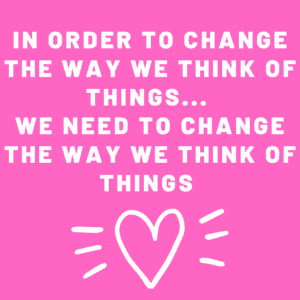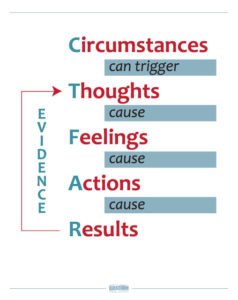Podcast: Play in new window | Download
Subscribe: Apple Podcasts | Spotify | Amazon Music | RSS | More
You’re not broken
Did you need to hear that?
This is the sex-ed we never received. The sex education, that because I didn’t get it, I went through the first thirty years of my life thinking something was wrong with me. Thinking that I was broken. Truly. And that’s what I hear and what sex therapists I’ve spoken to report, that the number one complaint of women is that they fear something is wrong with them. That they are broken.
But you’re not broken. We don’t know what we don’t know. Movies, books, and porn all portray a certain kind of lovemaking that is not helpful or accurate. Today, I want to illuminate some lessons that I wish I had been taught in school or by my parents that have helped me tremendously.
But first, the thought model!
And also, I want to remind you that sex is like anything else we address in coaching. It belongs in the circumstance line of the model. It is what we think about it that creates drama, embarrassment, shame, or discord in our lives. When we approach it with a growth mindset of curiosity, we are open to learn and grow. Learning these two let’s call them sex-ed lessons will help you shift the thoughts you think about sex. What we know from the thought model and our intelligence, is when we shift the thoughts we think about something, the way we feel about that something changes. That’s my hope. That instead of feeling broken and at a loss, you can begin to feel differently about your sexuality.
If you’re about to click back because you’re thinking: why bother? I have enough things to do or improve upon, I urge you to please keep reading. Because I thought that too at first. What I want to communicate is this is not one more thing that you’re doing for someone else, one more thing for your to-do list. Rather, it’s a gift to give to yourself. Something for you! Learning about and thinking differently about your sexuality will make you feel better. You can decide what to do with the new knowledge you have. All I ask is that you keep listening with a growth mindset; a curiosity. Choose the thought that learning about this may make you feel less stress, less overwhelm, and more connection. Want that? Keep reading!
Responsive or spontaneous desire
First lesson, learning that there are two main types of desire. Emily Nagoski, an expert on woman’s sexuality, first brought these terms to my attention. Basically, there are two ways we get turned on and ready for sex, in our heads or in our bodies. Our desire can be responsive or spontaneous. I like to think in metaphors and it’s helpful for me to think of desire like a slow cooker or a microwave. Neither is better or worse. They are two ways of getting to the same place. Movies and media show the microwave type desire. This, oh I see him look at me and I feel instantaneous spontaneous desire. Back in the early days with our mates, it’s possible we felt the microwave type of spontaneous desire. We’d see our partner and feel a tingling in our body. He’d hand you a flower and you’d think let’s get up to bed! Add years of togetherness, quarantine, financial or family stressors and this sort of desire doesn’t happen as often. He may no longer be handing you flowers or, if he is, you may be thinking, now what, I have to find a frigging vase? Really?
Our mind is elsewhere. And that’s okay. What’s not okay is thinking that you’re broken because you don’t have that microwave, spontaneous desire. Nope.
You’re not broken. You’re human!
Learning about this allows us to get deliberate and intentional about building and turning on our responsive desire. To get that slow cooker to work we have to plug it in. We have to turn it on. Responsive desire can build during the day. Responsive desire happens in the thought line of the model. What thoughts are you thinking to turn on your slow cooker? What thoughts get your body humming and warming up? What can you notice about yourself, your partner, your situation that gets your body feeling tingly? For me, once I learned about the different kinds of desire and that I wasn’t broken, it meant getting more intentional and mindful about my desire. It means that I pause and notice things that are attractive to me and about noticing things in my environment that seduce you. Again realizing that desire is in the first line of the thought model so we get to intentionally think thoughts that create the feeling of desire. This then leads to my next sex lesson for today.
Accelerator and brakes
Credit Emily Nagoski for my learning and exploring this concept too. Think of your sexual desire as having accelerators and brakes. Similar to the pedals on the car. There are things you can do to make your car go faster, pressing the accelerator, and things you can do to make it slow down, pressing on the brakes. Once I realize that desire doesn’t just happen, I can become aware of what my accelerators and brakes are. Sure, there are things that delight me and accelerate my desire but if I have more brakes than accelerators, what wins? So yes, once again, it all starts with awareness. Maybe get out a journal and brainstorm: what are accelerators and brakes for you? Once I started making my list, I’d consciously and intentionally increase the accelerators in my life while decreasing the brakes.
If I want my desire to slowly build over the day, pausing and noticing my husband’s broad shoulders is helpful. Pausing to feel his hand on my lower back accelerates that responsive desire. It also helps me to consciously and deliberately take my foot off the brakes. If I know we are planning to connect later that night (there’s another blog – scheduled sex), that can help me not procrastinate so I don’t have that work project hanging over my head. I’ve heard women say body image is a brake for them. If you are planning on intimacy that evening, it can motivate you to do that exercise session or to shave your legs. Do what you can to remove the brakes and add to the accelerators. What are your brakes and accelerators? I’d love to know. Make sure you’re part of our warrior women community as we will be talking about this all this month.
Understanding how we get turned on and understanding how we get turned off… leading me to point three:
Emotional connection
So yeah…maybe I’m the last to learn this but… We need to feel emotionally connected to want sex. There are countless studies on this yet since I’m not a researcher, I’ll share my own experience as a 49 year old woman and a coach who speaks with hundreds of women. It’s true. The more emotionally connected we feel, the more likely it is that we will want sex. For me, when I feel understood and supported, I am more open and willing to even plug that slow cooker in. A big part of me being open and interested in sex lies in me feeling emotionally connected to my spouse. When I think he’s listening and understands me, I’m ten hundred times more interested in getting closer to him physically.
Interestingly, men often report the opposite. When they feel emotionally disconnected from their spouse, they want sex to bring them back together. As I said, I’m not a researcher though I do wonder if some of this has to do with the patriarchy and men being told they can’t let their guard down and share their big emotions, which would lead them to feel a release in sexual intercourse. Since I’m not a man, I’ll leave that to my husband and other great males to podcast on. For now, let’s address the female emotional connection. Knowing that I need emotional connection and knowing how my brain works has led me and my husband to have the knowledge of some of the differences between the male and female brain. Namely that when the female brain feels a feeling, 9 parts of her brain light up. This is at least 6 more parts than the male brain. She wants to address that.
One tool that has helped many couples, myself included, is what I call the 20 minute bucket. It has been reported by neuroscientists and sex educators that a woman needs 20 minutes of emotional connection a day to feel emotionally connected. This is 20 minutes of talking and sharing, not him giving advice, fixing, or debating. For the husbands out there, this means you listen. You shake your head up and down. You say things like “really?” And “oh wow, tell me more”. You parrot back what she’s saying instead of trying to fix what she’s feeling or trying to find a solution.
For example, she says she’s frustrated because her mom calls her so frequently during the day. You listen and then repeat back what she says: “your mom is interrupting you?” And “you think she complains too much?” And “oh wow, how do you get anything done” and mostly nod and look at her eyes. Not your phone. Not the ceiling. Not her breasts. Look. At. Her! You do not say “Well tell her to stop” or “I find your mom totally annoying too”. Nope. You listen. You repeat. You use your two ears twice as much as your one mouth. For the women, this is not just the male responsibility. You ask for what you want. You say “I need to talk right now. I don’t need you to fix this”. Trust me. When you’re feeling more emotionally heard and held, you will be much more open to being physically held. Win-win!
Speak up!
Which leads me to the final point. Speak up! If you’re not enjoying sex, you’re not going to want more of it. The female orgasm is more finicky and it’s up to you to know what feels good and to communicate that to your partner. As Dr. Sonia Wright spoke of in last week’s podcast, there is such a thing as a pleasure gap. In heterosexual couples, it’s about 70/30, yet in lesbian couples there isn’t so much of a gap. Huh…ponder that. My lesson is repeated again and again, you’re not broken. It’s not how it looks in movies. We were not taught this in school and so lose the shame, both of you. The man should just know what to do and the woman isn’t broken.
Bring a beginner’s mind or growth mindset to the bedroom and everyone will be well served. And yet repeat, you are your best sex instructor. Allow yourself time to explore and learn. Have a beginner’s mind. What feels good. Speak up. Yes, it may be uncomfortable for your partner to learn that you haven’t been enjoying it as much as you thought you were yet, truth bomb ladies, they sort of know. And, why not speak up now and start learning instead of waiting another 5, 10, 15 years and then having satisfying intimacy.
Life is too short ladies.
Notice how I say intimacy. This can look different for all couples. It doesn’t have to be penetrative sex. Stop looking to the movies, books, or porn to judge what’s right for you. You have the answers inside your body and feeling centers. Now let yourself be open and willing to explore. It is AWESOME for your health. the hormones released with a female orgasm is age-defying, metabolism-boosting, stress-busting. Use these lessons to move sex from your to-do list to your for-you list.
And, if you are not in a partnered relationship, this is the perfect time to learn! Learning by myself about myself is where the learning begins. You are your best sex tool and instructor. Allow yourself pleasure. Set a date with yourself, vibrator optional.
Remind yourself, you’re not broken. Sexual fulfillment is part of our wellness.
You and your health matter to me. Let’s go warriors!
Did you like this post? Sign up for Susie’s Weekly WELLNESS Newsletter. She’s a Certified Life and Wellness Coach with over 10 years of experience helping women live lives they love.
If you’re ready to take yourself and your life seriously, sign up for a coaching session. If you’d like a quick jump start, for the price of a daily lunch out or one coaching session, sign up for SMB’s 10-Day Boot Camp for Conscious Living.






